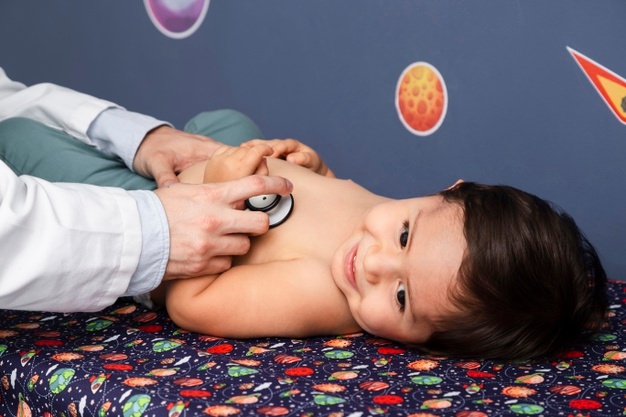A whole new phase of life begins when you become a parent. It is full of excitement and joy. A lot of things change. There are many new experiences. Even though this newness sounds exciting, it is also accompanied by confusion and anxiety. Especially for people having their first child, everything changes suddenly. It is now their responsibility to take care of someone who is unable to move or eat for himself or herself. It is crucial that we understand their needs without systematically comprehensible verbal communication. One of the first doctors your child will see after birth is a pediatrician. For young parents, however, knowing when to see your pediatrician, and for how long, can sometimes be confusing.
Even though almost everyone knows the basic needs and care of a baby, there are certain areas in which we cannot and should not take any chances, and that is where a pediatrician comes in. Pediatricians specialize in the care of children and children’s behavior.
At some point, almost every child requires an expert or professional care. It is very important to have your child examined by a pediatrician beforehand. A pediatrician who knows your child from birth or even before would have a better understanding of the problem than a person you run to in an emergency. The importance of having a good pediatrician cannot be overstated.
Any new parent or even those with their second or third child may be confused about whether or not to call their pediatrician. It is perfectly normal to worry about finding that your child is in pain. Determining whether to contact a pediatrician immediately is a dilemma.
However, this article by Dr. Supriya Rastogi – the best Pediatrician in Faridabad will attempt to provide you with a better understanding of infant behavior and answer your question of “to call or not to call”.
For Children under 3 months of age:
Your baby’s first three months are very important. They are still learning everything about the world around them. Even the slightest change affects them. Following the instructions of your pediatrician is extremely important for you to take good care of your baby. Any sudden or unexpected change in the behavior of an infant must be noted and closely observed.
Fever
The presence of fever is actually a good sign, as it means that the temperature is rising in order to fight off a viral infection, but in the case of a baby of three months or younger, it can be concerning. Pediatricians should be contacted even if the baby’s temperature is as low as 100 degrees. The baby’s immune system is not very strong at this stage, so fever can indicate something more serious.
Vomiting
Vomiting is usually not a cause for concern in a child on its own. In any case, if the condition persists or is accompanied by other symptoms, such as fever, it becomes problematic. Generally, vomiting indicates a viral infection that lasts no more than a day, i.e., 24 hours or less. Dehydration must be taken care of when a person is only vomiting. To prevent dehydration, give the child a fluid. Dehydration is characterized by lack of tears while crying, less urine discharge than normal (fewer than six wet diapers per day), dark color urine, sunken eyes, dry lips and mouth, crankiness, and sunken soft spot on top of the head.
Vomit that is red or black is a dangerous sign that cannot be ignored.
Cold
A cold is not something to be concerned about in adults or even older children. Viral or seasonal, it will pass on its own. A pediatrician should be contacted as soon as possible in the case of an infant of three months or younger. A pediatrician is better equipped to diagnose the start of a cold, that is, whether it is a normal cold or the start of something more serious, such as pneumonia or croup.
For children of above 3 months:
The child’s immune system matures after three months. The immune system has had enough time to adapt to its surroundings.
Fever
If your child is 3 months or older, a slight fever is not a big deal. If it persists for more than three days, the child should see a pediatrician. 104 degrees above normal should be a cause for concern if the child’s temperature is consistently above 104 degrees. Fever is especially worrisome if it is accompanied by other symptoms such as rash, trouble breathing, difficulty waking, persistent vomiting, or diarrhea.
Vomiting
If the child has only vomited once, then there is probably nothing to worry about. The child’s pediatrician should be informed if it occurs more than once and doesn’t stop within a few hours. It is important to take care of dehydration in such cases. The child should drink enough fluids to prevent dehydration. A pediatrician should be notified if a child shows any signs of dehydration.
Cold
When it comes to colds, children older than 3 months generally have nothing to fear. It is normal for a child to have six to eight colds in a year. If, however, the cold does not improve after a week or the child has a stuffy nose for more than 10 days, you should consult a doctor. When your child is having difficulty breathing or his or her ear hurts, you should contact the pediatrician right away.
Another condition that needs pediatric care is a purplish rash that hurts the child or goes deep into their skin, pain while peeing, sore throat, and whenever you are not sure whether to call a pediatrician or not.

